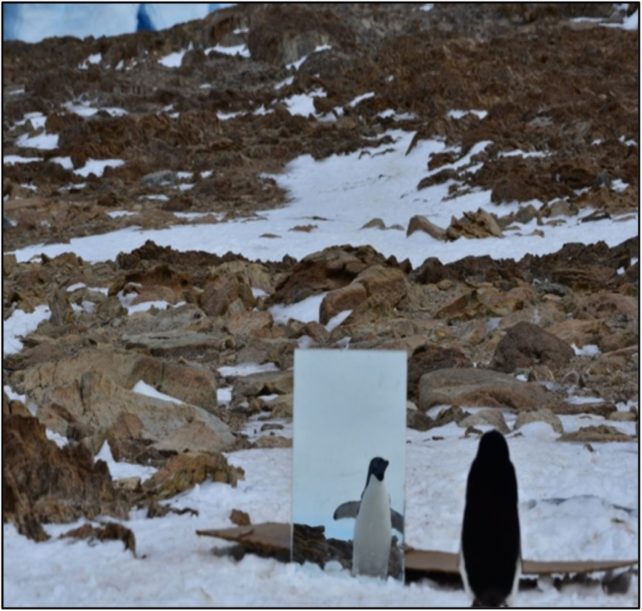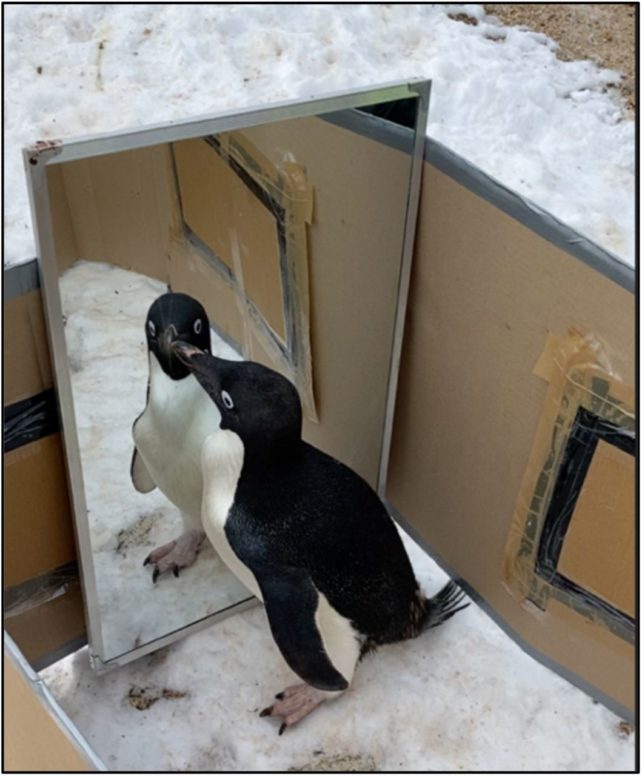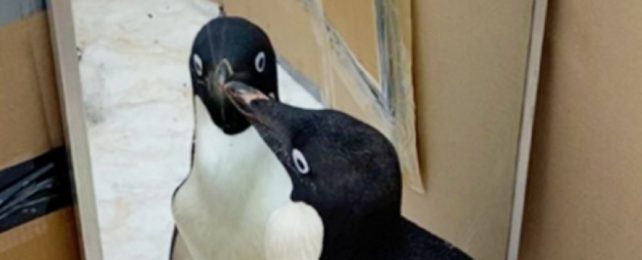Over the decades, scientists have held a literal mirror up to various animals to determine whether their minds feature some kind of representation of self.
Elephants, apes, dolphins, Eurasian magpies and cleaner wrasse fish are just some of the menagerie to join humans and chimpanzees in this exclusive club, each responding to their reflection in a way that shows understanding that it represents themselves.
Scientists have now put Adélie penguins to the mirror test, coming up with mixed results. While it might be premature to conclude penguins have a sense of self-awareness, the research team still feels there's enough evidence to consider it plausible.
Created in the 1970s by Gordon Gallup, the mirror test has become a classic experiment for demonstrating self-awareness in animals. The method is relatively straightforward. Animals are first habituated to a mirror to get used to its presence and reflectivity. When the test subject is sedated, an obvious mark is place somewhere on their body, where they can't see it directly. On seeing the mark in the mirror, a self-aware animal will behave in a way that demonstrates they're aware it's their body that is marked, and not some other individual.
As intuitive as it might seem to assume reactions to a reflection under different circumstances might indicate some kind of distinction in self, the test isn't without its limitations. Yet it remains one of the few means by which we can begin to probe the thinking of another mind.
In a preliminary study awaiting peer review, a team led by Prabir Ghosh Dastidar at India's Ministry of Earth Sciences introduced wild Adélie penguins (Pygoscelis adeliae) to their own reflections during a series of experiments.

Penguins are highly social animals, with Antarctic species relying on colonial huddles to endure the frigid extremes of winter. These animals are also relatively easy to test in a wild situation, unlike many other mirror tests that have required animals to be in a captive environment.
A waddle of 12 penguins were exposed to the mirror under different conditions. When exposed as a group there was little reaction, but when isolated by cardboard enclosures and individually exposed to the mirror the animals investigated their reflections.
"The penguins made rapid movements of their heads, flippers, or of their bodies, some of which appeared to be gestures," the team writes in their paper. "Many of these movements and gestures were rapidly repeated, but strikingly, the visual attention of all the subject penguins was firmly on their images during the entire timespan of their performance."
The birds did not attempt to make contact with or display any aggression toward their mirror image, suggesting they perhaps 'knew' on some level the bird in the mirror was neither friend nor foe, leaving only themselves.
When they were 'marked' with a red bib, however, the penguins failed to react the the change in their appearance.
The team admit that there is anecdotal evidence not all penguins can even see red though, so they're not confident in this result.
"Such experiments should be better designed in the future," suggest Dastidar and colleagues, nevertheless, "our investigations lead us to tentatively suggest that Adélie penguins are possibly self-aware, as indicated by their responses to their own images in a mirror."

Since its inception some half a century ago, there has been increasing evidence the mirror test is not as clear-cut as proposed. Many animals known to be highly social fail the test, including monkeys, unless they're trained how to use a mirror first.
Animals that we're pretty confident are self-aware have failed it too, including gorillas.
Take dogs for example. They're capable of empathy, a trait that also implies a sense of self and others, yet they typically fail the mirror test.
"I believed that because dogs are much less sensitive to visual stimuli with respect to what, for example, humans and many apes are, it is likely that the failure of this and of other species in the mirror test is mainly due to the sensory modality chosen by the investigator to test the self-awareness and not, necessarily, to the absence of this latter," explained Tomsk State University evolutionary biologist Roberto Cazzolla Gatti in 2015.
Gatti tested this with a sniff test equivalent of the mirror test for dogs. The dogs were tested to see how they reacted to displaced snow that had been marked with their own or other dogs' urine. Sure enough, the canines spent way more time smelling the urine samples of the other dogs.
"This test provides significant evidence of self-awareness in dogs and can play a crucial role in showing that this capacity is not a specific feature of only great apes, humans, and a few other animals, but it depends on the way in which researchers try to verify it," said Gatti.
Other tests have since backed up the idea that dogs do have a clear sense of self, even if it may not be visually based.
What's more, even our own children can fail to pass the mirror test, with a number not passing until they're six years old in some countries. So while the mirror test might be able to indicate the presence of some self-awareness, failing it doesn't seem to confirm a lack of this trait that's so vital in sociality.
The original creator of the mirror test is skeptical of the penguin results so far.
"Penguins may indeed be capable of self-recognition," Gallup told New Scientist. "But it would require a lot more serious science than what is contained in this paper."
In light of the complexities it may be that like many other traits, self-awareness exists as a spectrum rather than a dichotomy as the mirror test implies. This would mean we require new experiments to probe this aspect of consciousness.
This research can be read through bioRxiv and is awaiting peer review.
